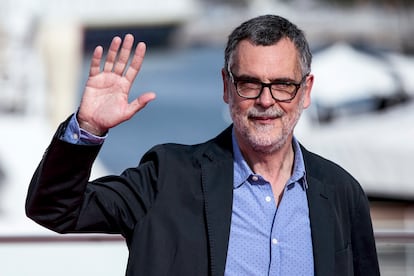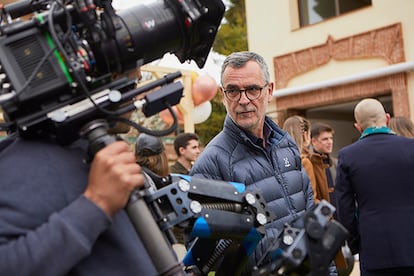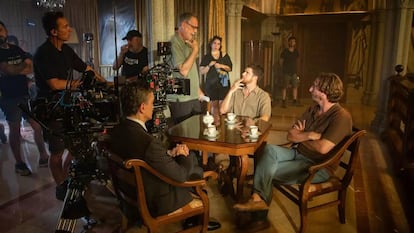Movie roles in exchange for nude pics: 27 women accuse filmmaker Eduard Cortés of sexual misconduct
The director, twice nominated for a Goya and creator of series such as ‘Merlí' and ‘Raising Voices’, admits to EL PAÍS that he contacted women on social media for two of his projects, but claims that ‘they were never explicit job offers’

Twenty-seven women have told EL PAÍS that they were sexually harassed by the filmmaker Eduard Cortés, twice nominated for the Goya Awards — Spain’s equivalent of the Oscars — and director of the popular TV series Merlí and Raising Voices. The photographer Silvia Grav, the visual artist Eva Fàbregas, the actresses Sofía Barco, Norah Alexandra Vega and Nicole León, among other women interviewed by this newspaper, all accuse Cortés of having benefited from his position in the industry to offer them work in one of his productions on condition that they film themselves naked, masturbating or engaging in other types of sexual practices. Most of them were between 20 and 30 years old at the time, and two of them were underage. Everything came to light on October 26, when Grav turned to Instagram to share some old messages exchanged with the Barcelona-born film director, and accusing him of grooming her. Dozens of women added to this testimony from their own social media accounts. This newspaper has had access to almost a hundred of these conversations, dating from mid-2007 to October of this year.
Cortés, 65, contacted them through Fotolog, Facebook, MySpace, Messenger and Instagram, as well as by email and Skype video calls, for more than a decade, according to these women’s accounts, which are supported by the messages provided to EL PAÍS. In some of his social media profiles, the filmmaker used the pseudonym Gato del cerro, but once the conversation had started, he always introduced himself with his real name. From the beginning he made it clear that he was a film director (in some cases he sent a link to Vimeo, a video platform, to prove his resume), explaining that he was preparing a project and that he was looking for actresses. This newspaper has interviewed women in Madrid, Barcelona, Valencia, Malaga, Santiago de Chile, Sardinia, Los Angeles and Mexico City. Only three of them ended up working with him.
“The only thing I can say is that I did a project called Ingrid, which was linked to social media, and I contacted a lot of people during that time [before 2009, when the film was released],” Cortés said in response to these accusations last Friday in a telephone conversation with EL PAÍS. Two days after this interview, the filmmaker sent a new statement via email, supervised by his lawyer: “The conversations on social media took place on a hypothetical basis, within the search for connections between the character’s way of acting and our personal experience. They were never explicit proposals,” the filmmaker stated. In the Friday telephone conversation he had said: “This is my version of the facts. From here on, the perceptions that other people may have are beyond my remit. And also, obviously, there may have been some degree of misinterpretation or poor management of the conversation on my part.”
“This man contacted me when I was 19 and he was 55, promising to help me professionally.” This is the message, with an image of Cortés, that Grav shared on her Instagram profile in October. This post against the filmmaker came just a few days after the Errejón case made headline news — involving anonymous complaints of sexual misconduct against the Spanish left-wing politician Iñigo Errejón — which is why it had such an impact that within a few hours, the photographer began receiving dozens of messages with similar stories about Cortés. Since then, she has been contacted by more than 50 women, and 38 of them have created a WhatsApp group called Ni una más (Not One More, a riff on the original Spanish title of the TV series Raising Voices), this newspaper has been able to verify.
At least 15 of the women interviewed by this newspaper have taken the first steps to file a formal complaint. They have sought legal advice from a law firm and have been gathering evidence for the last month. The women contacted by EL PAÍS, initially encouraged by the possibility of a class-action suit, are now complaining about the high cost of the legal services: €850 ($892) plus tax for each individual complaint. They also underscore the “lack of action” by various cultural institutions with support offices for victims of violence in the film industry.

At the end of October, the Catalan Film Academy announced that it would open an investigation following the allegations published on social media, as Cortés was a member of that entity. The probe was not carried out. Cortés announced he was quitting the Academy in late November via email, before he could be summoned to testify and get the investigation started, as Laia Aubia, director of the Catalan academy, explained to EL PAÍS, and Cortés himself has confirmed: “I spoke with the president [Judith Colell] and I resigned for personal reasons,” explained the filmmaker. After informing him of his departure, Aubia said that “the investigation was being provisionally shelved and that it would be restarted if he requested membership again.”
The Catalan Academy recommended that the women interviewed by EL PAÍS go to the offices of Carla Vall, a private law firm that collaborates with this institution in an independent service for the care of victims. It was this lawyer who offered legal advice to the complainants. Because many of them could not afford the law firm’s fees, several turned to the Spanish Film Academy, which recently created a special unit to assist victims of gender-based violence in the cultural industry. This department is run by the Aspacia Foundation (financed by the Ministry of Culture). “At Aspacia they told me that they could not offer us anything better than the Catalan Academy,” says Norah Alexandra Vega. The foundation’s managers declined to answer questions from this newspaper.
When the accusations started to spread on Instagram, Cortés had just finished filming the series Terra Alta, which adapts the novel of the same name by the writer Javier Cercas. His last premiere was the successful series Raising Voices, produced by Netflix and starring a 17-year-old student who reports sexual assault by a teacher at her high school. In 2002, he premiered Nobody’s Life, for which he was nominated for a Goya for best new director; Other Days Will Come (2005), nominated for a Goya for best original screenplay; Ingrid (2009), The Pelayos (2012) and Near Your House (2016), a musical about evictions starring the singer-songwriter Sílvia Pérez Cruz, who won the Goya Award for the song Ai, ai, ai. In addition, he directed three seasons of the TV3 series Merlí, which later became a hit on Netflix.
Work as bait
Once the conversation with these women began, Cortés praised their work, according to messages provided to this newspaper. “He told me: ‘You have talent, you are beautiful, intelligent and young, you have a lot of potential,’” Grav narrates via video call. “I was in a very vulnerable situation in a professional environment of which I knew absolutely nothing. Eduard was interested in offering me a role in one of his films, he even suggested that I could maybe direct,” the photographer continues. A month after their first contact, the tone of the conversation changed: “He began to ask me how I felt about doing nudes, if there was anything that approached a sexual experience in it. It was evident that I was uncomfortable with the conversation but I did not let him know for fear that he would lose interest in helping me professionally.”

Eduard Cortés

Silvia Grav

Eduard Cortés

Silvia Grav

Eduard Cortés

Silvia Grav

Eduard Cortés

Silvia Grav

Eduard Cortés
Do you have a boyfriend?

Silvia Grav
Nothing serious, why do you ask?

Eduard Cortés
Do you look at yourself naked in the mirror?

Silvia Grav

Eduard Cortés

Silvia Grav
In most of the testimonies, according to the messages, when Cortés’ attempt to establish a sexual relationship did not bear fruit, the director suggested that the women agree to perform certain sexual practices due to “the project’s requirements.” “When he spoke to me about the story he was writing, which he said he wanted me to star in, he told me that it was essential that I dare to do something similar to Ingrid [in reference to the sex scenes],” recalls Grav. In subsequent messages, Cortés asked her if she wanted to pursue film studies. “I said yes, but that I didn’t have any money, so he offered to teach me in exchange for me being a nude model for him. I didn’t answer him,” she explains. The last time they exchanged messages, he told her: “I really want to sexualize you.” Grav says: “That’s when I cut the conversation short.”
According to what she explained to this newspaper and on her Instagram account, Cortés also spoke to the artist Eva Fàbregas about “a script for what would later become Ingrid,” she says. “Cortés assured me that the protagonist was based on me and that he was writing the script after having met me and because of my work on Fotolog,” the woman continues. “We met on two occasions and then I filmed a sequence of Ingrid at the Apolo nightclub in Barcelona as an extra,” she says.
All the women EL PAÍS spoke to confirm this same story: the director offered them a future role in Ingrid or in a project that would be a sequel to that film. “These exploratory works were limited only to the script process, which had already been discussed previously. They never resulted in tests or online castings, or anything that was produced through photographs or videos or video conferences,” Cortés alleges in the text sent to EL PAÍS.
Some of them agreed to have more intimate conversations at certain times, which had nothing to do with their professional life. One woman, who prefers not to give her name because she was 16 years old at the time and until recently felt “responsible” for what happened to her for not having stopped it in time, explains: “His way of trying to manipulate me was by telling me that the photos I uploaded to Fotolog were very good, then he would go on to make sexual comments. I came to think that he liked me, that I was an incredible photographer and he was a famous director who saw my potential.”
They were in contact between 2014 and 2018, it was in that year that Cortés suggested that she travel to Barcelona to do a test that did not materialize. “He made me believe that I could be an actress,” she explains, “but I didn’t go, I didn’t trust him.” On January 30, this woman informed the Association of Women Filmmakers and Audiovisual Media (CIMA) of what she had experienced with Cortés. The only response she received, she says, was an email, to which this newspaper has had access, in which she was informed of the ways to request help and file a complaint: “It was a bit disappointing, I didn’t feel like continuing, it seemed like a machine was answering me.”
“He contacted me in 2020, praised my work as an actress and offered me his Vimeo account so I could see his work. I was quite excited, I was 23 years old and I was finishing my acting degree,” explains Sofía Barco. Other actresses like her, as well as photographers, visual artists, dancers and filmmakers, among other professions linked to the cultural industry, described to EL PAÍS a precarious work situation, since they were at the beginning of their careers or at a time of special vulnerability in their jobs.
“He told me what attracted him the most about me and what he wanted to exploit: my sensual quality, my feline and mysterious gaze. He wanted to create a script that would break the boundaries between reality and fiction,” Barco continues, claiming that he made her this proposal: “He asked me if I would be willing to be in a play that would help me grow in my career in exchange for getting anesthetized in the last act and letting the audience do whatever they wanted with me. I think this was the conversation from which there was no turning back.” After four years of talks and what she defines as false promises, this young woman temporarily quit acting.
Regarding this specific case, Cortés said over the phone: “That was a misinterpretation. I had a project, which involved the character voluntarily anaesthetizing herself, inspired by The Sleeping Beauties by the Japanese novelist [Yasunari] Kawabata. The idea was this, I didn’t want to anaesthetize anyone.”
A filmmaker who prefers not to give her name because she fears it would affect her work, began talking to Cortés on Facebook in 2010. At that time, this woman says that she was looking for “any kind of internship” because, she says, “she needed the money.” “Over time, Cortés, who was very insistent, asked me to do some online camera tests where I would show my breasts. I refused and he suggested that I wear a deer’s head so that I wouldn’t be recognized and he would pay me €400 [$420]. I didn’t do that either,” she remembers.
Nicole León, an Ecuadorian actress and writer living in Valencia, was offered the chance to make a screen adaptation of her book El grito de mis heridas (The Cry of My Wounds), in which she recounts how she had been raped since she was a child. To carry out the project, this woman gave him details of these abuses and how she had decided to film the pain she felt from inside her vagina. “It’s not going to be easy to keep a cool head. I’d like to explore your sexuality,” he replied, in a conversation that she showed to this newspaper in July of this year. “The more I told him or delved into my traumas, now I understand, the more he got excited,” León laments. “I continued to believe in him and to go in deeper for the sake of the script. I realized that it was all a farce when I saw the public complaint from a girl, from Silvia [Grav], and that there were more girls, and that we all had the same pattern. And then I knew that there would be no film about my story,” she says.
A Mexican actress living in Spain agreed to be filmed naked in person by him. “He asked me if I had filmed nudes. I told him yes. I just wanted him to finalize the job offer,” she recalls. They met on three occasions. “On the second occasion,” she explains, “we met in an apartment in Barcelona. There he filmed me naked, and I felt that he was holding back, that anything could happen.” “Months later I asked him what he was going to do with the images, and he wrote me that he was very busy, that he needed time.”

Cortés asked these women to send him photographs and videos in which they appeared naked, according to their testimonies. At least seven of them assured EL PAÍS that they sent them. The director responded by email to this matter: “Everything related to photos, videos and video conferences was never part of the project. These were dynamics that were established between two adults and with mutual consent. The rest belongs to the intimate and personal sphere.”
It has been more than a month since they mobilized to ask for legal support and try to file a collective complaint against the filmmaker. But these women say they have felt alone in the face of institutions that had promised to help them, at least with legal and psychological support, but also with an internal investigation. “The Catalan Academy told us that they were going to create a committee, but we have just found out that Eduard Cortés has left the academy before they investigate him,” says Norah Alexandra Vega. “They have not even contacted us or asked for our testimonies. I can understand why many women do not speak up.”
With additional reporting by Isabel Valdés.
Sign up for our weekly newsletter to get more English-language news coverage from EL PAÍS USA Edition
Tu suscripción se está usando en otro dispositivo
¿Quieres añadir otro usuario a tu suscripción?
Si continúas leyendo en este dispositivo, no se podrá leer en el otro.
FlechaTu suscripción se está usando en otro dispositivo y solo puedes acceder a EL PAÍS desde un dispositivo a la vez.
Si quieres compartir tu cuenta, cambia tu suscripción a la modalidad Premium, así podrás añadir otro usuario. Cada uno accederá con su propia cuenta de email, lo que os permitirá personalizar vuestra experiencia en EL PAÍS.
¿Tienes una suscripción de empresa? Accede aquí para contratar más cuentas.
En el caso de no saber quién está usando tu cuenta, te recomendamos cambiar tu contraseña aquí.
Si decides continuar compartiendo tu cuenta, este mensaje se mostrará en tu dispositivo y en el de la otra persona que está usando tu cuenta de forma indefinida, afectando a tu experiencia de lectura. Puedes consultar aquí los términos y condiciones de la suscripción digital.








































